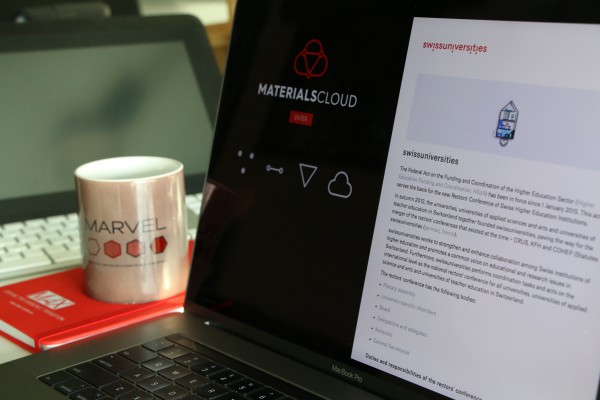New Materials Cloud Archive offers easier submission and record management for authors
Carey Sargent, EPFL, NCCR MARVEL
The new platform, launched today, makes it easier for authors to manage their submissions and records. Personal accounts give authors an overview of all submitted records and make it easier to both submit new records and modify existing ones, e.g., to update the scientific citations or keywords linked to a data entry directly. This replaces the previous method, which required authors to save a unique token per submission and go through archive moderators for any update of published records. The update also brings full-text search on all data records and lets authors reserve a DOI before their record is published.
The transition will also, critically, meet the need to scale record moderation: the number of records submitted annually has tripled each year since the first record was published in 2017. By separating the roles of authors, moderators and administrators, the Materials Cloud Archive can now recruit moderators from outside the developer team, drawing upon the scientific expertise present in the MARVEL community and beyond. The new, integrated moderation workflow allows moderators to review submissions and request changes directly through an intuitive web interface.
“This should speed up the work of the moderators because moderation is now completely integrated into the application,” said Marco Borelli, a scientific assistant at EPFL’s Laboratory of theory and simulation of materials (THEOS) and a moderator of the Materials Cloud Archive. “This means that there are just some buttons to click to accept or reject, to ask for some changes or to send an email to the author. All of these exchanges are tracked in a database and so we all know at any moment what is happening and what has been discussed.”

The new Materials Cloud Archive uses the open-source invenio 3 framework, developed at CERN, and battle-tested by the Zenodo repository, a general-purpose research data repository holding more than 2 million records. As before, the application is hosted on virtual machines in the OpenStack installation at the Swiss National Supercomputing Centre (CSCS). Data is stored on the Swift Object Store provided by CSCS, with backup replication elsewhere.
The new version builds on a strong platform. The Materials Cloud Archive already allows authors to submit a data record associated with a paper and get an associated DOI. Use is free for any entry up to 5GB—or 50GB if AiiDA is used—with larger limits for project partners, including, notably, the NCCR MARVEL, MaX and swissuniversities. There is a long-term data storage guarantee of at least 10 years from the submission date and entries are moderated, assuring a minimum of quality control.
The archive has been recommended by Nature’s journal Scientific Data, by FAIRSharing.org, and listed in RE3DATA.org as providing stable archiving and long-term preservation of datasets. The metadata of archive records is indexed by Google Dataset search and EUDAT B2FIND.
“Thanks to this update, the Materials Cloud Archive is strengthening its role as a leading repository for sharing FAIR data in the field of Materials Science,” said Giovanni Pizzi, project leader of the MARVEL Open Science platform and project manager of the swissuniversities P-5 “Materials Cloud” project. “This makes it even easier to share research data, to access it in an interoperable way—also thanks to the coupling with the other Materials Cloud sections—thereby accelerating scientific research and discovery.”
Low-volume newsletters, targeted to the scientific and industrial communities.
Subscribe to our newsletter